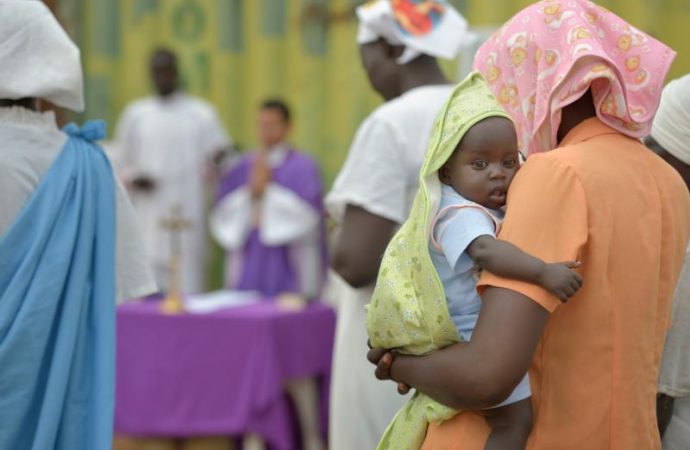Gabriella Gambino, undersecretary for the “life” section of the Vatican department for Laity, Family and Life, says Western mothers ought to take notes from migrants, whose stories often appear to reflect a more balanced concept of motherhood.
Looking at the stories of African women who’ve migrated to Europe, many of whom became pregnant as a result of rape or after falling victim to traffickers, Gambino said their example as mothers “makes us enter into a world we don’t know in our Western countries.”
These are women “who come from unheard-of sufferings, whose motherhood is the result of violence, drama, suffering.” Yet they’re women “able to rework this suffering, making themselves mothers in the most authentic sense of the word.”
Gambino, a mother of five and one of a few women holding a leading role in the Roman Curia, spoke at a Nov. 9 presentation of the book, Antikka: Stories of arrival and departure, motherhood wanted or unaware, of violence suffered, recounting real-life stories of African women who migrated to Europe, often suffering rape, forced prostitution, violence, war and poverty.
The stories were compiled by Antonella Ferraiolo, a gynecologist at Saint Martin Hospital in Genoa, where more critical cases are often sent. After speaking with many of the women, Ferraiolo was inspired by their stories and their resilience, and asked if they would be willing to share their experiences for the book.
Despite everything, Gambino said, these women “are able to recognize in their children the presence of God, women who in front of the idea of abortion say, children bring joy…things that in the West are difficult for us to understand, because often we live maternity in the inverse way: motherhood as a fatigue, motherhood as a choice, as a productive decision.”
She said that while mothers in Western countries are in a sense “more aware” of issues related to child development, they often have difficulty balancing motherhood.
Many find it difficult to be both “woman and mother,” she said, noting that women often receive conflicting messages from society, which is in part due to the sexual revolution of the 1960s.
The post-modern feminist emphasis on independence and productivity makes it difficult “to be both a feminine woman, and to be mothers,” Gambino said, adding that this is something migrant mothers can teach Western culture.
“These women are a bit of a prototype of a motherhood completely different, a motherhood lived in its essence, in the feminine dimension,” she said, adding that women migrants “are those who, especially from African countries, live with violence but who can offer the world their motherhood, they are women who truly know how to live motherhood as having, not doing.”
“We in the West are women who work around motherhood, we have so many things to do, but they are women who go to the point. They intuit the reality they carry in their womb, they understand it…(they are) the ones who welcome life, care for it and bring it to the world, offer it to the world,” she said.
Gambino said the book is a tool by which Western women can measure “our ability to welcome our own children,” and to measure one’s ability “to face human frailty…it measures our courage to want to care for life.”
In comments to Crux, Ferraiolo said that while doctors typically don’t establish a rapport with their patients, she began asking the women for their stories because “it is difficult to heal them if you don’t know them, if you don’t build a relationship.”
Noting how many of the African migrants have serious problems due to their journey and the situation after their arrival, she said “we only see a small part” of a much broader community.
Speaking of the firmer stance on migration taken by Italy’s right-wing Northern League populist party, Ferraiolo said while the government’s position is stricter in terms of welcoming migrants, Matteo Salvini, who heads the League, has had a softer approach toward women and children.
“He has always spoken in their defense, so this is something we have to try,” she said.
Flaminia Giovanelli, former undersecretary for the Vatican dicastery for Integral Human Development and president of the O Viveiro nonprofit organization, was also at the presentation. In comments to Crux, she said she believes Italy’s current government has some things right but doesn’t communicate them well.
During the campaign they made a lot of bold statements because “it brought votes,” she said, noting that in the time that has elapsed, many times, “they say the right things” on migration, “but the way of speaking about it is flawed.”
With an over-emphasis on numbers, which might not be accurate, Giovanelli said the focus on the migration issue needs to be not only on welcoming, but integrating, because most migrants “are all concentrated in certain places, on the peripheries of our cities.”
“They concentrate because they feel more secure. It’s an extremely complex situation,” she said. In her view, Giovanelli said more “creativity” is needed in finding ways to help migrants integrate, the first of which could be issuing three-year visas when they come to a welcoming center and giving them remittances.
“You must act on many levels, cooperation, investments, education, welcome. It’s a very complex problem,” she said, stressing that help must also be given to countries of origin, so people don’t feel the need to leave in the first place.
In her view, Giovanelli said the most important help to be given, especially for young women, is education, because “education levels are low.” Especially in Africa, some children must attend school in French or Portuguese, yet they don’t speak the language so they are not able to learn.
“We have to emphasize education, and also create the desire to do good for their own country,” she said.

